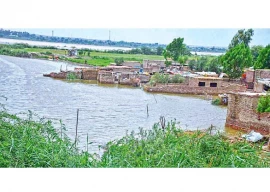
National Disaster Management Authority (NDMA) Chairman Lt Gen Inam Haider Malik on Wednesday expressed his gratitude to US Ambassador Donald Blome for Washington-led assistance to Islamabad for the victims of the recent devastating floods in the country.
The NDMA chairman also shared the authority’s vision of transforming its response approach from a reactive to a proactive one.
Lt Gen Malik highlighted the need for a futuristic technology-driven framework, which could be the interface of an integrated emergency response with all stakeholders, humanitarian agencies and international donors besides taking initiatives like the ‘Disaster Risk Atlas’ of the country.
He shed light on the National Institute of Disaster Management (NIDM) to become a commissioned, enabled and globally connected hub of climate research exchange and interaction of emergency responders for disaster risk reduction and climate adaptation in Pakistan.
The NDMA chairman also hinted at the need for global commitment to ‘Climate Millennium Goals’ in line with Sustainable Development Goals to secure a shared future.
Read NDMA quantifies losses in monsoon floods
He sought to learn from the US Federal Emergency Management Agency (FEMA).
Lt Gen Malik asked for an interagency cooperative framework between the NDMA and FEMA.
The ambassador highlighted the US' ongoing efforts with the support of diverse partners to minimise damages in the flood-affected areas of Pakistan and underscored the strong collaboration at the front of climate-induced disaster management.
Separately, the US through its embassy in Islamabad has joined hands with the Pakistani government to elevate the higher education sector of the country.
US Ambassador Blome joined officials from the University of Utah and Federal Planning and Development Minister Ahsan Iqbal to inaugurate the International Summit on Higher Education and Workforce Development on Wednesday.
The summit was organised by the US-funded Higher Education System Strengthening Activity (HESSA) and focuses on the role of higher education in the 21st century, highlighting the fluid nature of learning and employment, and exploring how universities can reposition themselves in this ever-changing landscape.

1724657897-0/Untitled-design-(2)1724657897-0-405x300.webp)
















COMMENTS
Comments are moderated and generally will be posted if they are on-topic and not abusive.
For more information, please see our Comments FAQ